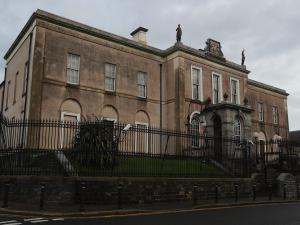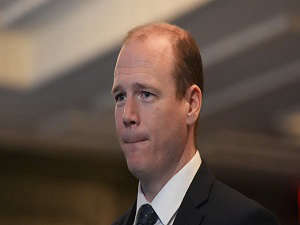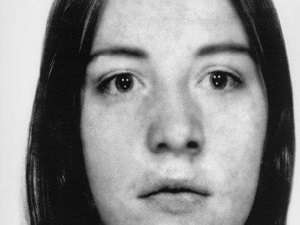
By John Cassidy
A CO. Down builder and bar owner narrowly avoided prison today (Tuesday) after he admitted cheating the revenue out of over £400,000 in unpaid taxes.
Bartley Murphy (53), of Ardglass Road, Downpatrick, was told by a judge that he was suspending his sentence of two years and three months for a period of three to reflect his culpability and as deterrent to others.
The father-of-four, who owns Murphy's bar in Downpatrick, had pleaded guilty to a single charge of cheating HM Revenue and Customs (HMRC) out of taxes over an eight period.
Downpatrick Crown Court, sitting in Antrim, heard that Murphy had pleaded not guilty to the charge last November when the tax bill he faced stood at £1.2 million.
But Judge Brian Sherrard heard that when his defence team engaged the services of a forensic accountant, and with the agereement of HMRC, that figure was reduced by two thirds to £422,142.10p.
Murphy was re-arraigned in March this year and pleaded guilty to the single charge of cheating the revenue on dates between April 1, 2007, and March 31, 2015.
A cheque was lodged into court today for the full amount owed which was result of the sale of his family home along with a £75,000 loan from brewers Bass to help settle his tax bill.
Prosecution lawyer Sam Magee said that Murphy was a self made builder who was liable to make self assessment returns on his income tax to HMRC.
However, the lawyer told the court that during that period Murphy made either 'nil returns' or 'no returns for self assessment.
He told the judge that in 2014 HMRC tried to engage with Murphy by writing to him on six occassions over an 11 month period but "Mr Murphy was unresponsive...and did not play ball'' during the civil process
Mr Magee said at as a result, HMRC referred Murphy's case to its internal Criminal Fraud Investigation Service who carried out what the court heard was an "intensely complex investigation''.
The court heard Murphy was arrested at this then home at Demesne Road, Downpatrick in December 2015 and taken to Bangor PSNI station for questioning where he told tax investigators: "I have nothing to hide.''
He told investigators that after the property crash in 2007, he "struggled to keep himself above ground'', adding: "I am a good builder but poor with paperwork.''
The court heard that during this period "tens of thousands of pounds'' had flowed through his bank account yet he "did not pay any money in tax''.
Mr Magee said Murphy had 48 previous criminal convictions, which included offences of low level violence, one for receiving stolen goods and a number for "non compliance with statutory regulations''.
Defence counsel Eugene Grant QC told the court that Murphy should be given credit for his guilty plea as it had "saved the court a lengthy trial'' along with costs of £100,000 each to both the defence and prosecution if the case had gone to trial.
He said Murphy presently worked as a £25,000 a year contracts manager for a building company of which his wife Angela was a director and it was currently building 30 homes in Downpatrick with the potential to build a further 50 homes in the south Down area, employing 15 subcontractors on the house building project. "He is the lynchpin of the business,'' added the defence QC.
Mr Grant said numerous testimonies had been handed into court about Murphy's charitable work in the community, including a letter from a friend who told how the defendant had "once saved his life''.
Judge Brian Sherrad said M
urphy had not been involved in any "illegal trade but the trade you were involved in was legitimate, worth while and continutes to be so''.
"This is not a case where individuals have been exploited or left out of pocket.
"Nevertheless this is a case in which our entire community has suffered. Revenue has a requirement for tax and tax is the fuel that keeps our society running, whether that is this court, the roads outside, hospitals or police stations. Tax is not optional.''
The judge said Murphy had cheated HMRC over lenghty but described his offending as "unsophisticated...this is not a case of brown envelopes exchanged from hand to hand, or complicated offshore fraud, or uncrossed cheques or payment in cash to others. This was a case of omission rather than commission. This offending was bound to have been discovered. Everybody knew this was coming.''
The judge added: "This entire matter, including the stress to you and your family, could have been avoided if you had simply co-operated with HMRC during the civil process.''
Telling Murphy that the custody threshold in his case had been passed, Judge Sherrard said that any person "who fails to pay tax of this amount over this period of time can only be dealt with by way of a custodial sentence to mark the gravitas of this offending''.
However, the judge said given his guilty plea and the effect Murphy's immediate imprisonment would have on subcontractors building new homes for his firm in the Down area, the judge said he would suspend the prison sentence of 27 months for a period of three years.
Judge SHerrard said he was also fining Murphy £15,000 "to reflect both the gravitas of your offending and also to mark that there is a real cost to anyone who does not comply with the civil process and to deter others from failing to engage with revenue at a timely and early stage''.


 Kneecap announce new song ahead of headline performance at London’s Wide Awake
Kneecap announce new song ahead of headline performance at London’s Wide Awake
 Gordon Lyons to attend first GAA match as Stormont Communities Minister
Gordon Lyons to attend first GAA match as Stormont Communities Minister
 Fresh appeal over 1973 murder of 18-year-old whose body was found in quarry
Fresh appeal over 1973 murder of 18-year-old whose body was found in quarry
 Kneecap say terror charge is ‘carnival of distraction’ and ‘political policing’
Kneecap say terror charge is ‘carnival of distraction’ and ‘political policing’
 Woman assaulted while jogging in West Belfast
Woman assaulted while jogging in West Belfast